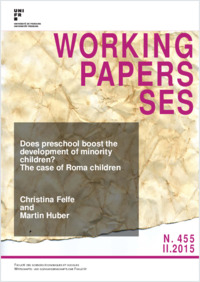Does preschool boost the development of minority children? : The case of Roma children
BP2-STS
-
01.02.2015
24
English
Does universal preschool constitute an effective policy tool to promote the development and integration of children from minority groups? In the light of rising cross border migration and increasing ethnic variation in many developed countries, we address this question for the children of the Roma - the largest and most disadvantaged minority in Europe. To tackle the issue of non-random selection into preschool, we exploit variation in the individual distance to the nearest preschool facility. Non-parametric instrumental variable estimations reveal significant short-term gains in terms of children›s verbal and analytical skills. Preschool attendance also increases the prevalence of vaccinations, but has no effect on other health outcomes. Overall, it also does not seem to enhance integration measured by language proficiency and peer relations, at least not in the short-run.
- Collections
- Faculty
- Faculté des sciences économiques et sociales et du management
- Language
-
- English
- Classification
- Education, teaching
- Series statement
-
- Working Papers SES ; 455
- License
-
License undefined
- Identifiers
-
- RERO DOC 234688
- RERO R008073147
- Persistent URL
- https://folia.unifr.ch/unifr/documents/304098
Statistics
Document views: 156
File downloads:
- Document: 293
